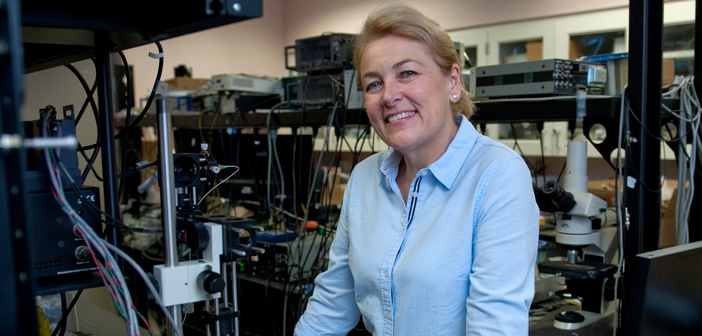Treating those in need
Revolutionary portable screening device helps detect oral cancer
Worldwide, oral cancer is the sixth-most common cancer-related cause of death, killing almost a quarter-million people each year. In low-income nations such as India, which has the world’s highest rate of oral cancer, the situation is more imperative, primarily due to limited awareness and limited access to specialized care for the underserved. In some parts of India, the disease kills more people than any other ailment. However, survival rates greatly rise if oral cancer is quickly diagnosed.
To increase early detection, BLIMC professor Dr. Petra Wilder-Smith has partnered with the Mazumdar Shaw Cancer Center in Bangalore, India, to conduct a National Institutes of Health (NIH)-funded study to develop and test a low-cost, portable screening device that field-workers can use to screen for oral cancer. The technology is enabling those who are rarely treated by a dentist to receive timely diagnoses and care, significantly improving their health.
Wilder-Smith developed the technology after she witnessed that at-risk patients who lived in remote villages did not have the funds or resources to travel great distances to the Cancer Center for monitoring. Also, she realized that patients avoided care because they found the biopsies – the standard practice at the time – to be too painful. These patients would often times go undiagnosed or seek treatment after it was too late. Taking these factors into consideration, Wilder-Smith designed a new pain-free, portable technology for use in remote areas. This device creates detailed laser images of oral lesions that can easily be sent by cell phone to the Cancer Center for evaluation.
“Petra is widely recognized for her visionary leadership in the pioneering use of optics and photonics technologies for improving oral health,” noted Dr. Bruce Tromberg, BLIMC director. “She has a special combination of abilities as a compassionate clinician with a unique understanding of patient needs, particularly in medically underserved communities.”
Over the past year, UCI teams have traveled to India with a prototype device to test on patients. They screened more than 12,000 people, identifying 1,200 with or at high risk of imminently developing oral cancer.
Wilder-Smith says these efforts are promising, and her team is gearing up for a larger campaign to help those across the nation. “We’re in conversations with several foundations and government groups to explore ways of expanding this program quickly – with the goal of saving thousands of lives,” she says.
Article adapted from, “Better screening of oral cancer in India,” featured in UCI Magazine and “Better than biopsies,” featured on UCI News. Both articles written by Tom Vasich.
Dr. Petra Wilder-Smith
In 1992, Dr. Petra Wilder-Smith joined the faculty of the Beckman Laser Institute and Medical Clinic (BLIMC), where she currently serves as dental director. Over the past two decades, she and BLIMC professor Dr. Zhongping Chen have created innovative methods based on optical coherence tomography (OCT) technology to detect and monitor oral cancer. OCT is unique because it allows high resolution imaging of tissue structure and blood flow beneath the surface where cancer starts. This can all be done non-invasively without having to perform a tissue biopsy.
Read full article in UCI Beckman Laser Institute & Medical Clinic’s LASER magazine.


